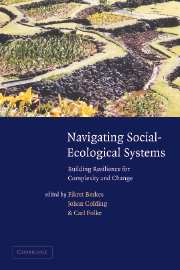Book contents
- Frontmatter
- Contents
- List of contributors
- Preface
- Acknowledgements
- Foreword: The backloop to sustainability
- 1 Introduction
- Part I Perspectives on resilience
- Part II Building resilience in local management systems
- Part III Social-ecological learning and adaptation
- 8 Exploring the role of local ecological knowledge in ecosystem management: three case studies
- 9 Facing the adaptive challenge: practitioners' insights from negotiating resource crises in Minnesota
- 10 Caribou co-management in northern Canada: fostering multiple ways of knowing
- Part IV Cross-scale institutional response to change
- Index
- References
8 - Exploring the role of local ecological knowledge in ecosystem management: three case studies
Published online by Cambridge University Press: 13 August 2009
- Frontmatter
- Contents
- List of contributors
- Preface
- Acknowledgements
- Foreword: The backloop to sustainability
- 1 Introduction
- Part I Perspectives on resilience
- Part II Building resilience in local management systems
- Part III Social-ecological learning and adaptation
- 8 Exploring the role of local ecological knowledge in ecosystem management: three case studies
- 9 Facing the adaptive challenge: practitioners' insights from negotiating resource crises in Minnesota
- 10 Caribou co-management in northern Canada: fostering multiple ways of knowing
- Part IV Cross-scale institutional response to change
- Index
- References
Summary
Introduction
Local resource users have come to play an increasingly significant role in the ecosystem approach to resource and environmental management. The way it is being organized, its relationship to the institutionalized, professional science, and its role in catalyzing new ways of managing environmental resources have all become important subjects (Kellert et al., 2000; Gadgil et al., 2000; Olsson and Folke, 2001). Local ecological knowledge is a central component of such management regimes, and in this chapter we present three case studies in an attempt to explore its role. These case studies deal with three contrasting socio-economic, cultural, and political settings: that of Sweden, a relatively equitable and homogeneous society; of Canada, a society with a gulf between the Euro-Canadians and the indigenous people; and of India, a highly stratified society but with strong traditions of learning and democracy conducive to the development of participation in resource management.
The development of local knowledge in management appears to have been motivated in two distinctive ways. On the one hand, it may attempt to complement the more general knowledge developed by professional science, with site-specific, contextualized knowledge generated by local users through local observations and experiments. On the other hand, local ecological knowledge may be an attempt to challenge those manifestations of professional science that tend to serve relatively narrow, vested interests. The first motivation dominates in the Swedish case study, where different levels of governance collaborate in a relatively smooth fashion and with similar value systems.
- Type
- Chapter
- Information
- Navigating Social-Ecological SystemsBuilding Resilience for Complexity and Change, pp. 189 - 209Publisher: Cambridge University PressPrint publication year: 2002
References
- 12
- Cited by



